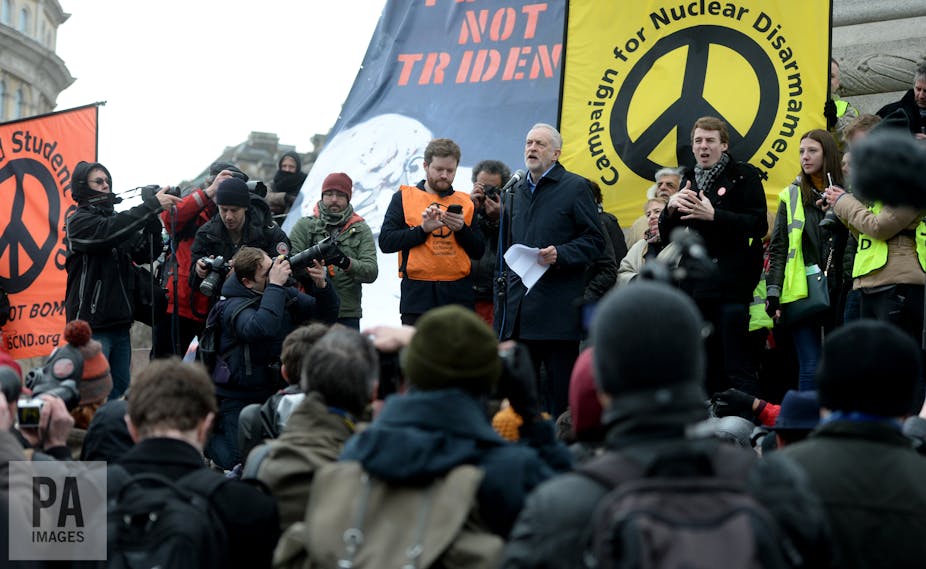Once written off as an electoral force even by much of the left, Jeremy Corbyn’s Labour has defied expectations to mount a late surge in the 2017 election polls. The New Statesman’s recent lament that the “stench of decay and failure coming from the Labour Party is now overwhelming” seems a distant memory.
The turnaround isn’t just a matter of style; it also has a lot to do with policy. And for a measure of how far Labour’s image has come, there are few better issues to look at than defence.
For the first nine months of her premiership, Theresa May confidently asserted her superiority as a steward of national security while Labour almost tore itself apart on what stance to take, with front bench colleagues sometimes even clashing in public. And when May called a snap election, Labour looked set to commit itself to unilateral nuclear disarmament and a re-run of its left-wing 1983 manifesto, still remembered as “the longest suicide note in history”.
But then Labour’s 2017 manifesto arrived – with a blunt commitment to renewing Trident. Corbyn, who only in 2016 addressed a Campaign for Nuclear Disarmament (CND) rally in Trafalgar Square on the theme of “NHS not Trident”, signed off on a manifesto featuring one vital phrase: “Labour supports the renewal of the nuclear deterrent.” So how did a left-wing pacifist like Corbyn reconcile himself to this policy position?
The simplest answer is that he still hasn’t. In several interviews and a BBC Question Time special, he was visibly cagey about his personal views on the nuclear issue and the all-important dilemma of “pushing the button”. But there’s another way to read this: by his party’s standards, Corbyn’s behaviour simply isn’t that anomalous.
Pressing on
For the last 70 years, Labour leaders have generally returned to Labour’s default position on the nuclear deterrent, as they have on defence more generally. And while this year’s manifesto pledge to renew Trident aims to unify a divided party, the nuclear deterrent has divided Labour ever since Britain’s first thermonuclear bomb was tested in 1957.
Many figures on Labour left of old were active in CND, and at the party conferences in 1960 and 1961, they came close to forcing the party to back unilateral disarmament. These moves were passionately opposed by the Labour right, with then-leader Hugh Gaitskell, vowing to “fight, and fight again” to resist the left’s efforts.
When Harold Wilson won the 1964 general election, he immediately committed the Labour government to pressing ahead with Trident’s predecessor, Polaris, which was only a year into its construction. He did so by lying to the party, claiming that the Royal Navy informed him that Polaris was “past the point of no return”. Party unity was Wilson’s primary concern in his 13 years as Labour leader, and the nuclear question was too divisive to be left open.
Corbyn’s Labour has a similar cohesion problem, but there are other reasons besides that he would commit it to renewing the deterrent. After all, defence is not only a matter of keeping the country safe, especially during a general election.
If Labour is to keep May’s overall majority in the single figures, it must hold on to or pick up various marginal constituencies. Trident matters to two in particular: the Labour-held seat of Barrow-in-Furness, where the Trident successor system will be built; and Plymouth Sutton and Devonport, a Conservative-held seat with a strong naval tradition. Their respective MPs enjoy majorities of only about 800 and 500 votes, and the impact of Labour’s nuclear commitments could be crucial.
The deterrent also happens to have a very considerable economic impact in the west of Scotland, where Labour surely wants to claw back some of the seats it lost in 2015.
Staying strong
The Trident debate has overshadowed Labour’s commitment to the other aspects of defence, such as conventional weapons and the defence industry. As a left-winger, Corbyn may be more comfortable arguing that defence funding should be diverted to cyber warfare, intelligence and policing, while criticising the Conservative government for scrapping HMS Ark Royal and the Harrier jump-jet, which was commissioned by Labour in the 1970s.
Indeed, the defence industry figures strongly in Labour’s manifesto, which declines to indulge any of Michael Foot’s ideas about “converting” defence production for commercial use. The manifesto also proposes a defence industrial strategy white paper, with a plan to “provide good jobs down the supply chain”.
Historically, Labour was responsible for initiating Britain’s first atomic bomb, and committing ground forces in Korean War and the conflicts in Afghanistan and Iraq. It devoted enormous sums of public expenditure to the military, especially in the Cold War. And while many of its rank and file are passionately devoted to disarmament, a good many Labour voters believe in a strong defence policy – as do the public as a whole.
Understandable then that for all of the chatter about its leader’s supposedly radical beliefs, Corbyn’s Labour has gone to the electorate with a plan concerned much more with continuity than change.

